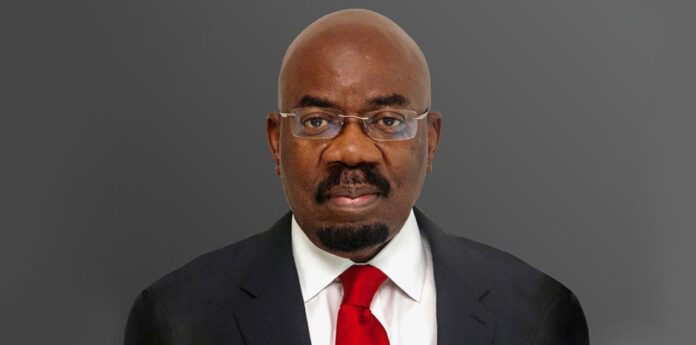On a humid afternoon in Lagos, whispers filled the financial press: Jim Ovia had just pocketed another ₦7 billion in dividends. It was not the first time, and it would not be the last. For some, it sounded like an unimaginable windfall; for others, it was the punctuation mark in a story that had been unfolding since 1990—when a young banker dared to plant a seed in Nigeria’s rocky financial soil. That seed, watered with vision, discipline, and resilience, grew into Zenith Bank: an oak tree whose roots now run deep into every corner of Nigeria’s economy.
The tale of Zenith is inseparable from the story of Ovia himself. Picture Lagos in the early 1990s: the city restless, the economy reeling from inflation, uncertainty hanging thick in the air. In those days, banking was not for the fainthearted. Failed institutions littered the landscape like abandoned shells. Yet amid the turbulence, a man with horn-rimmed glasses and an unflappable demeanor believed Nigeria needed a different kind of bank—one built not merely to survive the storm but to outlast it.
Ovia founded Zenith Bank with modest capital, a handful of staff, and an audacious dream. He was not just chasing numbers; he was crafting an institution of trust, technology, and transparency. Through the boom-and-bust cycles of the 1990s, he stayed the course. While others stumbled, Zenith found its rhythm, powered by a culture of excellence that became its signature. From there, Ovia’s name would be etched not just in banking, but in philanthropy, real estate, telecoms, and technology—his fingerprints scattered across Nigeria’s modern business landscape.
Fast forward 35 years, and Zenith stands tall, celebrating an anniversary in 2025 that feels less like a birthday and more like a coronation. Yet the road to this milestone has been anything but smooth. Nigeria’s macroeconomic climate remains unforgiving: inflation eats into households, currency volatility rattles investors, and regulatory hurdles make banking a daily chess match. Against this backdrop, Zenith’s half-year 2025 results read like chapters from a war diary—narratives of battles lost and battles won.
Yes, profit before tax dipped by 13.95% to ₦625.63 billion compared to last year. For critics, this might have been the headline. But beneath that figure lies a deeper story: gross earnings surged by 20% to ₦2.5 trillion, interest income jumped a staggering 60% to ₦1.8 trillion, and net interest income nearly doubled to ₦1.4 trillion. Total assets reached ₦31 trillion, customer deposits climbed to ₦23 trillion, and capital adequacy stood firm at 26%—well above regulatory thresholds. Non-performing loans declined to 3.1%, while liquidity was a comfortable 69%.
What do these numbers mean? They mean that even as the storm howls, Zenith is not just holding its ground; it is advancing. The dip in profit reflects the reality of Nigeria’s economic headwinds, yet the growth in earnings and the fortress-like balance sheet reveal a bank playing the long game. Repricing risk assets, tightening treasury management, and staying nimble—these are not reactive moves but strategies carved from decades of experience. In the battlefield of finance, Zenith is the veteran general that knows when to retreat, when to hold, and when to charge.
And then there is Ovia himself, no longer the day-to-day commander but still the architect-in-chief, guiding as chairman since stepping down as CEO in 2010. For him, the rewards have been immense, but never detached from the fortunes of those who invested alongside him. His ₦7 billion interim dividend in 2025, from 4.14 billion direct shares and 1.65 billion indirect shares at ₦1.25 per share, tells part of the story. It is a 25% rise from last year—a sign that Zenith rewards loyalty. Compare that to his haul of ₦25.4 billion in 2024, ₦11.35 billion in 2023, and ₦16.24 billion in 2022. The figures are staggering, yet they underscore a truth: shareholders eat from the same table, and when Zenith serves, it serves generously.
But perhaps the bigger story is not Ovia’s billions; it is the example he sets for Nigerian enterprise. How many banks have been swallowed by the tides of history? How many institutions buckled under political pressure, poor governance, or sheer mismanagement? Yet Zenith stands—a sturdy oak, its branches still bearing fruit three decades on. For entrepreneurs struggling to navigate Nigeria’s volatility, the lesson is clear: vision anchored in discipline is stronger than any storm.
Critics might ask: is it fair that one man earns billions while millions struggle? The answer lies not in envy but in perspective. Ovia did not stumble upon Zenith by accident. He built it, brick by brick, from a time when the odds were stacked against him. His billions are not just personal rewards; they are the byproduct of value created for millions of customers, thousands of employees, and countless shareholders. In celebrating his resilience, we acknowledge the possibility that Nigeria’s next great entrepreneurs—today’s dreamers tinkering in small offices and cluttered markets—might one day stand where Ovia stands.
As Nigeria wrestles with inflation, currency depreciation, and questions about the future of its economy, Zenith offers a story worth holding onto. It reminds us that institutions can be resilient, that leadership matters, and that long-term vision pays dividends—not just literally, but figuratively for the entire economy.
So, what lies ahead? The epilogue is still being written. Zenith cannot afford to rest on legacy alone. To stay unyielding, it must keep innovating—embracing fintech disruptions, expanding digital banking, and reaching the unbanked millions who remain outside the formal economy. The oak must not only survive; it must sprout new branches. Yet if history is any guide, Zenith will not merely adapt to the times; it will shape them.
And when the story of Nigerian banking is told a century from now, one name will stand like a beacon through the storms: Jim Ovia. His legacy is not just the billions earned but the institution he built—an enduring Zenith in an economy that often feels anything but.



